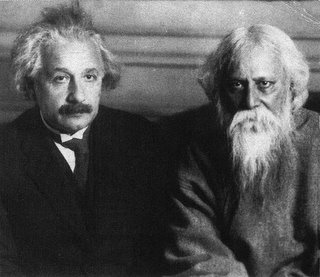Ethics in business is the source of a troubled heart. On one hand you have business houses (VERY SUCCESSFUL business houses, may I add) that have a philosophy which says "To hell with everything else, business is all about being a profit making enterprise". To them, nothing should stand in the path of their success. Absolutely NOTHING. In a country which ranked 88th on a Corruption Perceptions Index in 2005, I do not need to tell you twice about the kind of bribes that are paid by companies to get into the favorable books of authorities.
Then again there are the house of Tata's and Infosys. These companies have re-defined the way corporate governance is interpreted in India. Time and again have they been lauded with doing things that were ethically and morally correct. Of course, the drivers of such business practices have been at the top, right from Jamsetji, JRD, to Ratan Tata and to the likes of Narayanmurthy.
You might wonder what caused me to write about business ethics and morals on such a fine Sunday morning.
Well, 2 things.
1. The HR project that my team submitted yesterday, which was titled "Ethical Challenges in HR"; and
2. The book "Freakonomics". I have been reading the bestseller for the Book Club review this Wednesday. An extract:
"There is a tale, “The Ring of Gyges,” that Feldman sometimes tells his economist friends. It comes from Plato’s Republic. A student named Glaucon offered the story in response to a lesson by Socrates—who, like Adam Smith, argued that people are generally good even without enforcement. Glaucon, like Feldman’s economist friends, disagreed. He told of a shepherd named Gyges who stumbled upon a secret cavern with a corpse inside that wore a ring. When Gyges put on the ring, he found that it made him invisible. With no one able to monitor his behavior, Gyges proceeded to do woeful things—seduce the queen, murder the king, and so on. Glaucon’s story posed a moral question: could any man resist the temptation of evil if he knew his acts could not be witnessed? Glaucon seemed to think the answer was no. But Paul Feldman sides with Socrates and Adam Smith—for he knows that the answer, at least 87 percent of the time, is yes."
The 87 per cent idea comes from the meticulous data that Feldman had recorded from his business collections where he would just place bags of bagels in offices and leave a small box with a slit on top for people to pay for the bag. On an average, his collections from the box was 87 per cent.
Just two more points:
1. On one hand, Glaucon uses the Ring of Gyges to prove his point that morality is just a social construction, i.e. we would like to project an idea in society that we are morally correct in our thinking; the moment our actions are invisible to society (like when the ring is put on) we would give in to temptation. Interestingly, this idea was also present in J. R. R. Tolkien's The Lord of the Rings, where the One Ring not only made the one who wore it invisible but also corrupt. Umm...Gollum gollum....My precious !!
2. Here is an interesting twist given by Scott Adams. Trust him to come up with something witty; yet true. It was this response from a regular reader that prompted him to put forward his ideas:
"A co-worker of mine is so cheap that he bought one of the portable electric batteries that you can charge up for emergencies, like jumpstarting your car or running appliances off of during camping trips, and brings it to work everyday and lets it charge in his cubicle. He then takes it home and runs his lights or microwave off of it. He says he is forcing the company to pay him a little extra by taking electricity home. He also tries to time all of his bodily eliminations to occur at work so that he uses company water for flushing etc… to further save himself money and cost the company."
What would you do if you would chance upon the Ring of Gyges?
Then again there are the house of Tata's and Infosys. These companies have re-defined the way corporate governance is interpreted in India. Time and again have they been lauded with doing things that were ethically and morally correct. Of course, the drivers of such business practices have been at the top, right from Jamsetji, JRD, to Ratan Tata and to the likes of Narayanmurthy.
You might wonder what caused me to write about business ethics and morals on such a fine Sunday morning.
Well, 2 things.
1. The HR project that my team submitted yesterday, which was titled "Ethical Challenges in HR"; and
2. The book "Freakonomics". I have been reading the bestseller for the Book Club review this Wednesday. An extract:
"There is a tale, “The Ring of Gyges,” that Feldman sometimes tells his economist friends. It comes from Plato’s Republic. A student named Glaucon offered the story in response to a lesson by Socrates—who, like Adam Smith, argued that people are generally good even without enforcement. Glaucon, like Feldman’s economist friends, disagreed. He told of a shepherd named Gyges who stumbled upon a secret cavern with a corpse inside that wore a ring. When Gyges put on the ring, he found that it made him invisible. With no one able to monitor his behavior, Gyges proceeded to do woeful things—seduce the queen, murder the king, and so on. Glaucon’s story posed a moral question: could any man resist the temptation of evil if he knew his acts could not be witnessed? Glaucon seemed to think the answer was no. But Paul Feldman sides with Socrates and Adam Smith—for he knows that the answer, at least 87 percent of the time, is yes."
The 87 per cent idea comes from the meticulous data that Feldman had recorded from his business collections where he would just place bags of bagels in offices and leave a small box with a slit on top for people to pay for the bag. On an average, his collections from the box was 87 per cent.
Just two more points:
1. On one hand, Glaucon uses the Ring of Gyges to prove his point that morality is just a social construction, i.e. we would like to project an idea in society that we are morally correct in our thinking; the moment our actions are invisible to society (like when the ring is put on) we would give in to temptation. Interestingly, this idea was also present in J. R. R. Tolkien's The Lord of the Rings, where the One Ring not only made the one who wore it invisible but also corrupt. Umm...Gollum gollum....My precious !!
2. Here is an interesting twist given by Scott Adams. Trust him to come up with something witty; yet true. It was this response from a regular reader that prompted him to put forward his ideas:
"A co-worker of mine is so cheap that he bought one of the portable electric batteries that you can charge up for emergencies, like jumpstarting your car or running appliances off of during camping trips, and brings it to work everyday and lets it charge in his cubicle. He then takes it home and runs his lights or microwave off of it. He says he is forcing the company to pay him a little extra by taking electricity home. He also tries to time all of his bodily eliminations to occur at work so that he uses company water for flushing etc… to further save himself money and cost the company."
What would you do if you would chance upon the Ring of Gyges?



